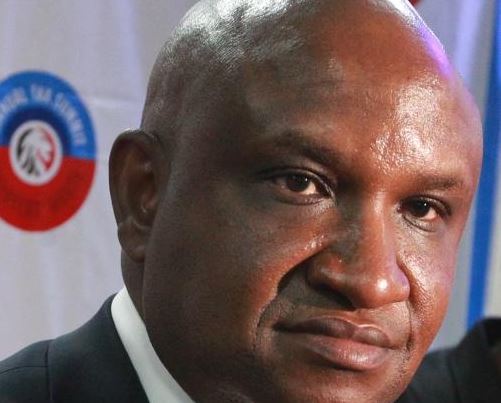 Kenya Revenue Authority Commissioner General Githii Mburu. [Jonah Onyango, Standard]
Kenya Revenue Authority Commissioner General Githii Mburu. [Jonah Onyango, Standard]
Increased economic activities in December last year saw the Kenya Revenue Authority (KRA) surpass
its target for the first time during the Covid-19 era, netting more than Sh166 billion in taxes.Nearly all the tax-heads did well with the taxman beating the Sh164 billion target - a performance rate of 101.3 per cent.
“This was the first positive and above target collection rate since the outbreak of Covid-19 pandemic,” said KRA Commissioner General Githii Mburu in a statement.
“The improved performance is attributed to the economic recovery following the relaxation of the stringent Covid-19 containment measures and enhanced compliance efforts by KRA in December.”
The performance was buoyed by taxes on international trade with the Customs and Border Control Department recording the highest ever monthly revenue collection in the tax authority’s history by collecting Sh60.8 billion.
This reflected a growth of 41 per cent and resulted in a revenue surplus of Sh12.2 billion. “This resulted in a cumulative surplus for customs revenue of Sh3.8 billion at the end of December 2020, compared to a deficit of Sh8.4 billion as at the end of November 2020,” noted Mburu.
With employment picking up after the partial re-opening of the economy, Pay as you earn (PAYE) which is levied on permanent workers recorded the best performance at 99.8 per cent under the domestic taxes.
Withholding tax surpassed the target by Sh725 million, reflecting positive economic recovery prospects.
Corporation taxes, which is levied on large businesses, recorded a performance rate of 93.5 per cent against the target, with the taxman citing a decline in installment remittance from banks by a quarter from Sh13.140 billion in December 2019 down to Sh9.810 billion in the period under review.
Value-added tax (VAT) or sales tax charged on goods and services consumed locally, however, declined by a fifth as purchases increased at a faster rate (8.9 per cent growth) than sales (1.4 per cent growth).
As a result, VAT diminished the forecast for the month.
The Government expects this decline to reverse as businesses convert their stock into sales.
The reversal of Covid-19 tax relief measures that saw VAT slashed to 14 per cent to the standard rate of 16 per cent is also expected to lift the collection of this consumption tax.
Last year, said KRA, tax collection was dampened by decelerated economic growth following the institution of the health and safety measures aimed at curbing the spread of the disease.
Many businesses were shut down, with close to 1.7 million people losing their jobs in the second quarter of 2020, official data showed.
As a result, the Government initiated a raft of fiscal measures to cushion individuals and business entities against the effects of the Covid-19 pandemic. Besides reducing VAT to 14 per cent, the measures also included slashing the PAYE top marginal rate from 30 per cent to 25 per cent.
Those who earn a monthly salary of Sh24,000 and below benefited from a 100 per cent tax relief.
The corporation tax rate was reduced to 25 per cent from 30 per cent. “The revision of these tax rates meant a reduction in the revenue that KRA collects,” said KRA.
The State said the reversal of these measures would help the Government earn more revenues and help it finance its expansive budget which also includes a hefty stimulus package. Poor tax collection has seen the National Treasury fall behind in the disbursement of funds to the 47 counties.
Admitting that the delay was due to a tough business environment which affected tax revenues, National Treasury Cabinet Secretary Ukur Yatani expressed confidence that the reversal of Covid-19 tax measures would boost revenue collection.
Knock-on effect
Moody’s, a rating company, noted that while the reversal of the tax cuts will help alleviate some pressure from the underperformance of tax collection in the current fiscal year, it will have a negative knock-on effect on the economy. “Revenue collection, in particular tax revenue, has so far lagged what was collected in prior years, pointing to downside risks to the Government’s full-year target,” said Moody’s.
Poor revenue collection has seen the Government dive deeper into the debt market, with Treasury expected to borrow over Sh1 trillion in the current financial year ending June 30.
Moreover, the lack of liquidity has seen the Government negotiate for debt moratorium with some of its creditors.
Last Monday, ten countries under the Paris Club agreed to offer Kenya suspend loans due from Kenya for the period between January and June 20, 2021. Kenya is expected to save close to Sh32.9 billion from this debt repayment holiday.
The economy also continues to grapple with the pandemic, with the fresh fears being on the potential harm of the second-wave of Covid-19 that has seen some countries re-impose lockdowns to contain the spread of the disease.
This disrupts the global supply chain, gutting the country’s export and tourist earnings.
Some of the containment measures, such as the dusk-to-dawn curfew have been extended to the end of March, with President Uhuru Kenyatta noting that the disease was yet to be completely defeated.
It will also take time before global tourism recovers with Moody’s projecting that to be in the second half of 2021. KRA is banking on the ongoing implementation of the Post Covid-19 Economic Recovery Strategy 2020-2022, to boost revenues.




No comments :
Post a Comment